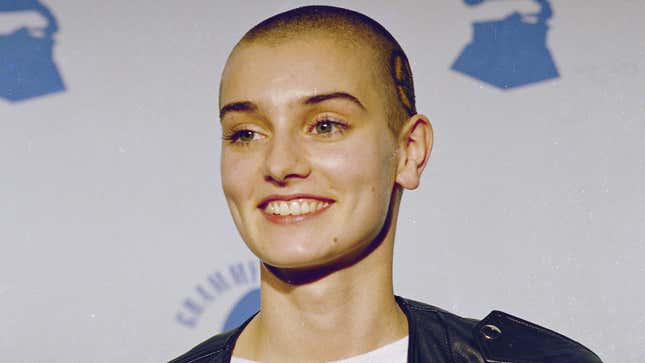In Rememberings, Sinéad O'Connor Finally Has Enough Space to Explain
"Everyone was already calling me crazy for not acting like a pop star. For not worshipping fame."
BooksEntertainment

Sinéad O’Connor is no stranger to controversy—she seems to carry it around with her in her back pocket. The Irish singer-songwriter showed up to the party with her head shorn and her mouth full of fuck yous to various establishments, and she hasn’t backed down in the years since her searing 1987 debut The Lion and the Cobra. But after reading her recently released memoir, Rememberings, it’s clear the constellation of scandals that backlit her commercial peak in the early ’90s was more a product of headstrongness than savvy.
To hear (or read, in this case) O’Connor tell it, she wasn’t a pop star but a punk, and someone who “couldn’t understand why anybody liked my songs or why anybody clapped or thought they were good.” This attitude only caused further clashes. She writes:
“Success” was making a failure of my life. Because everyone was already calling me crazy for not acting like a pop star. For not worshipping fame. And I understand I’ve torn up the dreams of those around me. But those aren’t my dreams. No one ever asked me what my dreams were; they just got mad at me for not being who they wanted me to be. My own dream is only to keep the contract I made with God before I ever made one with the music business. And that’s a better fight than murder. I gotta get to the other side of life.
Rather than a disaster, she credits her most famous display—tearing up a picture that she took from her dead mother’s wall of Pope John Paul II to protest child abuse—as a sort of salvation. “A lot of people say or think that tearing up the pope’s photo derailed my career,” she writes. “That’s not how I feel about it. I feel that having a No. 1 record derailed my career and my tearing the photo put me back on the right track.” But these words being O’Connor’s, they tend to provoke further inquiry. If she didn’t want to be a star, why did she sign with a record label, Ensign (a Chrysalis imprint), that could make her one? Why was she doing the pop star thing of sitting for interviews and making videos and taking her own opinion seriously enough to share it with the world?
Here’s how you know that you’re in good hands with O’Connor the author: She’ll lay you flat on your doubting ass with just a few sentences. “I’m not a pop star. I’m just a troubled soul who needs to scream into mikes now and then,” she writes. It’s not that O’Connor doesn’t have a pop star’s gift for sound bites; it’s just that content of hers tends to have more teeth than what is typically considered acceptable.
A book, it turns out, is a perfect vehicle for O’Connor, as it provides her with ample space to be messy and if not achieve completion, then approach it. Her music has long been multivalent—so gentle, so furious. (O’Connor recalls Anita Baker telling her during a Grammys rehearsal that her voice is “cavernous,” and I don’t think any single adjective is more apt to describe it). Interviews and social media require a pithiness that doesn’t fit with O’Connor’s labyrinthine logic or contradictions. It’s only in the ultra-long form that one can make sense of her inability, sometimes refusal, to make perfect sense.
-

-

-

-

-

-

-

-

-

-

-

-

-

-

-

-

-

-

-

-

-

-

-

-

-

-

-

-

-

-

-

-

-

-

-

-

-

-

-

-








































